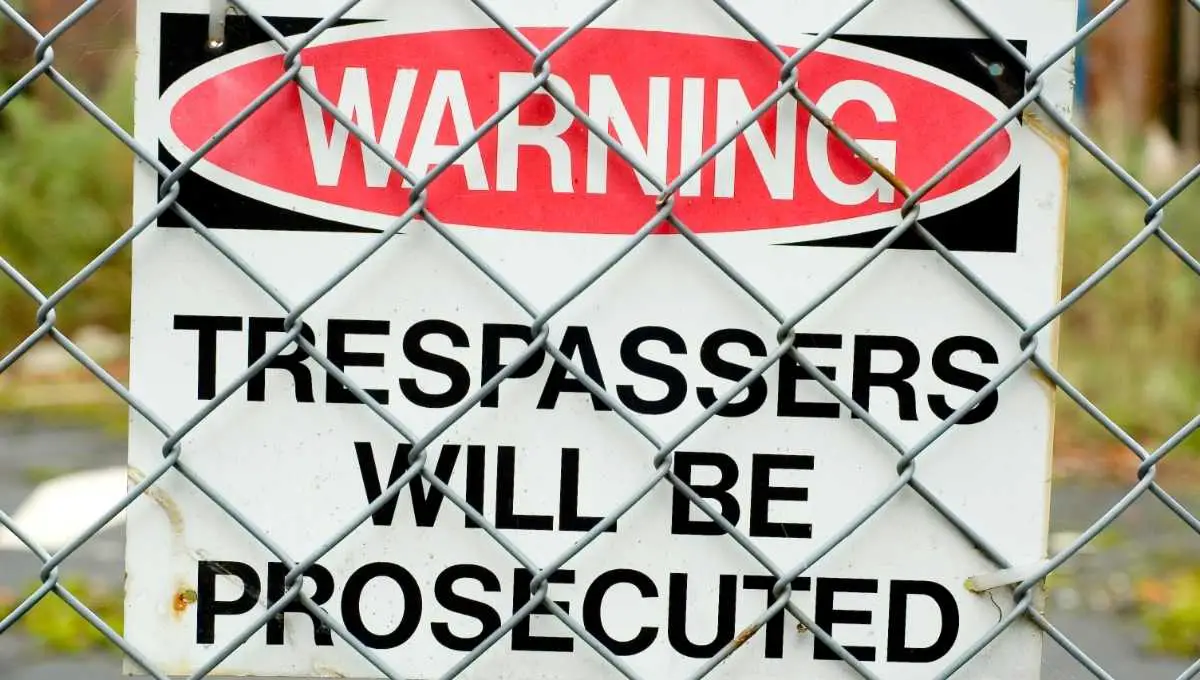How to Deal With Trespassing Neighbors for Good

Whether you live in a condo, apartment, or a house with a yard, there’s always the potential threat of someone trespassing on your property. There are laws that protect residents from instances of trespassing, but oftentimes it’s tricky to handle a neighbor who keeps trespassing on your property. If you are faced with this dilemma, it’s time to learn how to deal with trespassing neighbors for good.
The best way to deal with trespassing neighbors, is to first try talking to them about the situation. If that doesn’t work, you can put a “No Trespassing” sign in your yard. You can also put up a good fence to keep them out, or get a guard dog to watch over your property.
If these methods don’t work for your situation, there are other things you can do to enforce your rule on your property to ward off neighbors with boundary problems once and for all. Before you make your move, you should know first what constitutes trespassing and what it means for you legally.
Is It Illegal to Walk Through Someone’s Yard?
Policies may vary from state to state but generally, the legal definition of trespassing is “the act of entering someone’s property without permission” and that these people are aware that the area is not their property.
Criminal trespassing, in most cases, is defined as “entering or remaining on a premises or property in which one does not have the authorization, license or privilege to do so.”
So what are your rights as a property owner? You are entitled to use your property in any manner that is legal and that includes preventing other people from entering your space without permission and use your property exclusively.
Simply put, when your neighbor enters your domain and they know they don’t have permission to do so, or remain on your property after telling them they don’t have the right to be there, this clearly qualifies as trespassing.
You might also enjoy our post on What to Do If a Neighbor Tried to Open Your Door
What to Do If Someone Is Trespassing on Your Property?
Before you call the authorities on your neighbor, it’s best to do the following when trying to keep them off your property. These friendly approaches may save you the time and effort of going the legal route, provided that your neighbor will easily comply.
Put a Private Property or No Trespassing Sign
Usually, putting up a sign on your yard reminding people that yours is a private property should be enough to keep people out. Aside from marking your grounds, this sends a message to outsiders that you are in charge and will not tolerate trespassing.
Now the kind of sign that is most effective may depend on your location. There are trespassing laws and signage from state-to-state and there are types of signage that can give you legal recourse and help protect your property from intruders.
Create a sign that is large enough for anyone to read and place it in a spot where it definitely would not be missed.
If you are living in a large expanse of land, you will need more than one signage – in certain states, you should have several along your property line and also at all entries into your land.
You might also enjoy our post on How to Shut Down Your Neighbors Airbnb
Surround Your Area With Fences and Natural Barriers
Of course, there will always be people who are not put off by signs telling them to stay out of a private property. In this case, building a fence around your land should physically keep trespassers out.
Physical barriers such as fences not only serve as a marker for your property, but also sends a message to your neighbors that they cannot mess around your private space. This should also keep your neighbors’ pets and stray animals out of your yard.
Now if for some reason you cannot or prefer not to put up a fence, having natural barriers such as plants is your best alternative. You can plant thick bushes around your perimeter, but check first with your local community before doing so.
There may be rules about placing barriers or plants around private properties in your area.
Have Guard Dogs
If you don’t have a dog living with you, now it’s a good time to get one. Most people are scared of big dogs who can inflict serious physical damage when faced with intruders.
Some of the recommended breeds for guard dogs include German shepherds, Rottweilers, Dobermans, ad Scottish Terriers. If you can get one that is already trained, so much the better.
You might also enjoy our post on Neighbor Tried to Poison My Dog
Install Security Cameras
Not only will this monitor the comings and goings within your property, it will also produce solid evidence that you can use if ever you decide to pursue legal action against a trespasser.
Try installing an outdoor surveillance camera that comes with a two-way audio and siren, which is already useful in warning potential intruders. Motion detection cameras such as this one can send alerts on your mobile phone whenever someone enters your private space.
Here’s a good tip: make sure that your “No Trespassing” sign is highly visible in your video recordings. This is a much stronger evidence that can be used for complaints. You can also put a sign that says you have surveillance cameras all over the place so people will think twice about trespassing.
Install Motion-Activated Sprinkler
This is a good alternative if you prefer not having dogs guarding your yard. You can install these sprinklers in any particular spot or along the perimeter of your property. You have to put a warning sign along with it if you decide to install them.
You might also enjoy our post on How to Keep a Neighbors Chickens Out of Your Yard
Should I Just Call the Cops on Trespassing Neighbors?
What happens if somehow these measures do not work or you don’t want to resort to these for some reason? Calling the authorities is tempting, but try holding that off for the meantime. You may be also tempted to deal with the problem yourself in a physical manner, but this is not advisable.
If someone trespasses your domain despite being warned, the practical response is to ask him to leave. If he doesn’t, then you as a property owner is entitled to eject the trespasser via reasonable force.
What constitutes “reasonable force” can get tricky. According to a report from The Guardian, “the right to use reasonable force has evolved through case law and there is no single answer as to what is reasonable – it will always depend on the prevailing circumstances.”
Given this definition, it means that you are not entitled to harm or assault your trespassing neighbor in any way (unless there’s threat to physical safety).
You might also enjoy our post on Suspicious Car in Front of My House
In some cases, homeowners actually have to ensure that no harm comes to the trespasser. If there’s some danger or hazard on your property, you may have to offer some protection.
Again, instances will vary according to state or country, which is why it’s recommended to brush up on the legalities if you’re trying to solve this problem.
The next thing you can do is to have a friendly chat with the neighbor. The idea may seem uncomfortable to you especially if you’re not particularly close with him, but this is something you need to do to resolve the issue without having to escalate things further.
Here are the points you have to consider if you plan to have a talk with your neighbor:
- Most people prefer to settle the issue before it goes any deeper. There may be no need to go to the authorities regarding your problem if you can solve it with just having a person-to-person talk.
If you escalate this prematurely, you may damage your relationship with the neighbor and cause unwanted tension. Maybe all you need is to give your neighbor a chance to respond to your issue. - Try to find out if he or she has a history of violence, overreacting, or retaliating when confronted with something. This is very important because if he has such behavior, you have to think twice about talking to him.
- Your neighbor may not be aware that he is already offending you or he’s doing anything wrong. In your case, it could be that he used to stay or pass through your property before you moved in or the previous homeowner allowed him to do so. Sometimes all you need is a gentle reminder to easily resolve things.
- If you’re somewhat comfortable with the neighbor, consider inviting him over for dinner and bring up the issue in a more casual and comfortable manner. Things may go better when the discussion is done in a more friendly and relaxed setting.
Now if all of the above still didn’t work, it’s time to bring a third party for intervention. If your neighbor is renting his home, you can approach the landlord first. He may be able to do something about the problem without you calling the authorities.
As you can see, this is another step in exhausting all possible means before pursuing legal action.
You might also enjoy our post on Neighbor Stole My Dog (Do This to Get Your Dog Back)
What Are Your Legal Options for Neighbors That Constantly Trespass?
There are several things you can do if you have a neighbor that is constantly trespassing your property. One, you can seek a permanent injunction to keep him off your domain.
If the judge grants this, your neighbor would be in contempt of court if he continues to trespass on your land. He could be fined or put in jail.
Two, you can sue him for damages for trespassing. This is especially applicable if your neighbor puts his personal property on your land. You can get a court order prohibiting him from violating your property. In this case, a recommended lawsuit here would be for money damages for the loss of your property.
In both instances, you will need the services of a good real estate or criminal attorney.
You might also enjoy our post on Can My Neighbor Record My Backyard?
Criminal Penalties for Trespassing
If you reach this stage, you need to know the classification and penalties involved in pursuing legal action against your neighbor. Now in most cases, the courts will not impose heavy fines, penalties, or long probation periods.
The type and severity of penalties will differ among states. Since trespassing is not usually considered a major crime, courts do not impose stiff penalties.
But if ever a trespassing conviction leads to significant penalties and jail sentences, here’s what in store for the trespasser:
- Degrees – many states classify offenses such as trespassing in varying degrees. First-degree trespassing is more serious than the second-degree and covers illegal entry into home, private building, or land that are clearly marked as private.
Second-degree is less serious and typically covers entering property that is not clearly marked as private. This also involves cases in which a person remains on the property after being told to leave. - Jail – convictions that result in imprisonment is uncommon even if state laws allow courts to impose jail time for trespassing. If it does happen, jail time ranges from several days to several months. In extreme cases, imprisonment can go up to a year.
- Fines – fines for trespassing can be imposed separately from OR in addition to jail time. The amount varies, starting from a few hundred dollars to as much as $4000, or even more. This depends on state laws, as well as circumstances of the crime. This is why there are cases where an offender is made to pay only $25 as fine.
- Probation – this typically lasts about 12 months or longer. A convicted trespasser has to comply with probation rules, such as paying for court costs, fines, and a condition not to break any more laws.
Additional penalties can be imposed if the convict violates these conditions. Probations are either supervised or unsupervised, with the former imposed in more serious sentences.
It’s important to keep good relations with your neighbors, but it doesn’t mean that bad behavior should be tolerated. In order to balance this out, all attempts for peaceful resolution must be exhausted before escalating the problem to the authorities.
If it comes to this point, make sure to seek help only with a competent lawyer to sort out the legalities. With proper handling, you can maintain civility with the neighbors while protecting your property and privacy at the same time.






